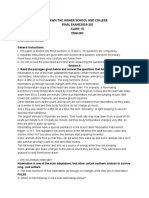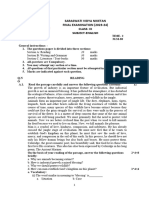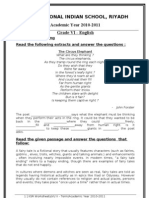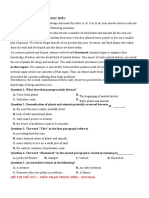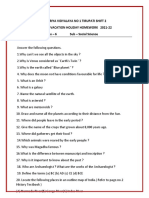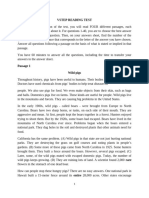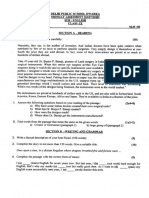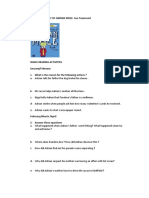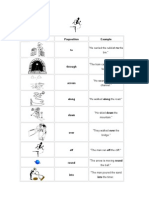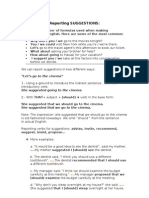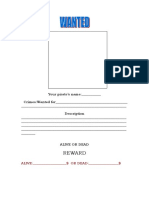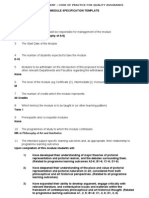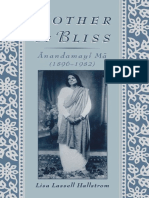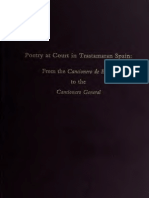THE TRUTH ABOUT BEARS Madrid JUNE 2010
THE TRUTH ABOUT BEARS Madrid JUNE 2010
Uploaded by
maridi30Copyright:
Available Formats
THE TRUTH ABOUT BEARS Madrid JUNE 2010
THE TRUTH ABOUT BEARS Madrid JUNE 2010
Uploaded by
maridi30Original Title
Copyright
Available Formats
Share this document
Did you find this document useful?
Is this content inappropriate?
Copyright:
Available Formats
THE TRUTH ABOUT BEARS Madrid JUNE 2010
THE TRUTH ABOUT BEARS Madrid JUNE 2010
Uploaded by
maridi30Copyright:
Available Formats
THE TRUTH ABOUT BEARS Madrid JUNE 2010
1.- Are the following statements TRUE or FALSE? Copy the evidence from the text. No
marks are given for only TRUE or FALSE.
a) The biologist collected factual information about bears, like the area where they lived and
travelled around.
TRUE: “he tracked their movements and marked them on maps.”
b) Making close contact with your object of study is normal in scientific research.
FALSE: “he abandoned scientific detachment and took the controversial step of forming
relationships with his study animals.”
2.- In your own words and based on the ideas in the text, answer the following questions. Do
not copy from the text.
a) What has the biologist discovered about the bear's diet?
The biologist has discovered that bears prefer to eat small insects which live in trees rather than
fruit or honey.
b) Why does he think humans are dangerous?
He thinks humans are dangerous because studies show that we kill more people than bears do.
3.- Find the words in the text that mean:
a) animals (paragraph 1): creatures
b) confidence (paragraph 2): trust
c) distance (paragraph 2): detachment
d) move (in the air) (paragraph 3): wave
4.- Complete the following sentences. Use the appropriate form of the word in brackets
when given.
a) Everybody believes that bears love eating/to eat honey.
SINGULAR
b) If we want to know the real facts about animals, we must /have to /need to/should/ought to
study them in action.
Rewrite the sentences starting with the words given:
c) It's not necessary to dissect an animal to know a lot about it.
You don't have/need to dissect an animal to know a lot about it.
You needn't dissect an animal to know a lot about it.
d) When Rogers went near the bear, he called to it "Don't worry, bear!"
Rogers told the bear not to worry.
5.- Write about 100 to 150 words on the following topic.
Pets in city flats? Argue for or against.
INDIA’S ECONOMIC REVIVAL Madrid June 2010
1.- Are the following statements TRUE or FALSE? Copy the evidence from the text. No
marks are given for only TRUE or FALSE.
a) In the past, people in the Western world dreamed about the treasures in South Asia.
TRUE: “Ever since the great Greek conqueror Alexander penetrated the Hindu Kush in 329
B.C., Europeans fantasized about the wealth of these lands”
b) While India was ruled by the British it became a typical example of underdevelopment.
TRUE: “By 1870, at the peak of the British dominion, India had been reduced for the first time
to a Third World nation, a symbol across the globe of famine, poverty and deprivation.”
2.- In your own words and based on the ideas in the text, answer the following questions. Do
not copy from the text.
a) Why are the Chinese emperors of the Ming dynasty mentioned in the text?
The Chinese emperors of the Ming dynasty are mentioned in the text because they were the sole
rivals of the rulers of India.
b) What kind of influence did the Portuguese, Dutch and British have on India?
The Portuguese, Dutch and British had a destructive effect on Indian trade and caused India to
lose its economic power.
3. Find the words in the text that mean:
a) riches (paragraph 1): wealth
b) powder (paragraph 1): dust
c) highest point (paragraph 3): peak
d) hunger (paragraph 3): famine
4.- Complete the following sentences. Use the appropriate form of the word in brackets
when given.
a) India is a country in South Asia which/that comprises most of the Indian subcontinent. The
Ganges is the longest river in India.
b) The term "colony" comes from the Latin colonia, which originally meant a place for
agricultural activities.
c) "How long does it take to fly from London to India?"
"It takes around nine hours."
d) The Ming dynasty began in 1368, and lasted until 1644 AD. Its founder was a peasant who
became Emperor after defeating the Mongols and the Yuan Dynasty.
5.- Write about 100 to 150 words on the following topic.
What distant or exotic country would you like to visit? Give reasons for your choice.
You might also like
- Voice Syllabus 2019 RCADocument132 pagesVoice Syllabus 2019 RCAFrancescoPellegrino100% (3)
- Light in The Darkness Discussion GuideDocument12 pagesLight in The Darkness Discussion GuideDisney HyperionNo ratings yet
- Esoterra ArticlesDocument73 pagesEsoterra Articlescecilia100% (1)
- Prueba de Acceso A Estudios Universitarios (Logse) Curso 2009-2010 (Junio)Document7 pagesPrueba de Acceso A Estudios Universitarios (Logse) Curso 2009-2010 (Junio)anon_296589581No ratings yet
- Exámenes Inglés Evau Resueltos The Truth About BearsDocument4 pagesExámenes Inglés Evau Resueltos The Truth About BearsMariamNo ratings yet
- Ix English QN PaperDocument26 pagesIx English QN Papervasanthstalin11No ratings yet
- 2022-23 Sample Paper Class 12Document242 pages2022-23 Sample Paper Class 12christianmaryantonyNo ratings yet
- Adjective Clause ExercisesDocument4 pagesAdjective Clause ExercisesBernard SinartaNo ratings yet
- Sample Paper and Answer Key English Xii MidtermDocument17 pagesSample Paper and Answer Key English Xii MidtermKashish KathuriaNo ratings yet
- English Term 2Document13 pagesEnglish Term 2dummy.svis1No ratings yet
- Ingles Septiembre 2000: Todo El Texto Todas Las Preguntas Lengua InglesaDocument2 pagesIngles Septiembre 2000: Todo El Texto Todas Las Preguntas Lengua InglesaEncarna MariaNo ratings yet
- Dawn The Higher School and College FINAL EXAM (2019-20) Class-Ix EnglishDocument6 pagesDawn The Higher School and College FINAL EXAM (2019-20) Class-Ix EnglishMean मिथुनNo ratings yet
- TermPaper31 Paper1 SDocument18 pagesTermPaper31 Paper1 S48nzwrdfxvNo ratings yet
- Soal Factual, Exposition and BiographyDocument45 pagesSoal Factual, Exposition and BiographyFabiolaIvonyNo ratings yet
- En Sample Paper 1 Unsolved-2Document13 pagesEn Sample Paper 1 Unsolved-2Mayank AtulkarNo ratings yet
- Latihan TOEFL ReadingDocument3 pagesLatihan TOEFL ReadingsusannnnnnNo ratings yet
- Grade 8 Reading AssessmentDocument4 pagesGrade 8 Reading AssessmentMylene PastranaNo ratings yet
- 10english 2022Document11 pages10english 2022AnushkaNo ratings yet
- Reading Comprehension (Đọc Hiểu)Document8 pagesReading Comprehension (Đọc Hiểu)Ngọc Ánh Phạm ThịNo ratings yet
- CBSE 2017 Class 9 Sample Paper English SA1Document4 pagesCBSE 2017 Class 9 Sample Paper English SA1Tripple BNo ratings yet
- Class 12 English Core Sample Paper 01Document18 pagesClass 12 English Core Sample Paper 01Mahesh DhakalNo ratings yet
- Xii (English) - Sample Paper 1Document12 pagesXii (English) - Sample Paper 1Mohit JainNo ratings yet
- Indonesia: BBC Learning English QuiznetDocument4 pagesIndonesia: BBC Learning English QuiznetCésar Ignacio OropezaNo ratings yet
- Class 6 Revision WorksheetDocument5 pagesClass 6 Revision Worksheetswathi thotaNo ratings yet
- Lecture 2 Reading ComprehensionDocument2 pagesLecture 2 Reading Comprehensionspideyxd1122No ratings yet
- English 1710045228949Document7 pagesEnglish 1710045228949reddyharshil581No ratings yet
- Tugas Bahasa InggrisDocument15 pagesTugas Bahasa InggrisUcupNo ratings yet
- Gradex 50%Document10 pagesGradex 50%documentsfile2024No ratings yet
- Practice Paper 1 Class XII Exam English-Core (301) : Time Allowed: 3 Hrs. Maximum Marks: 80 General InstructionsDocument11 pagesPractice Paper 1 Class XII Exam English-Core (301) : Time Allowed: 3 Hrs. Maximum Marks: 80 General Instructionsparthbhardwaj0711No ratings yet
- 9th-FINAL EXAM 2023-24Document5 pages9th-FINAL EXAM 2023-24RajniNo ratings yet
- Central Ideas and Details - OnlineDocument15 pagesCentral Ideas and Details - OnlinevusalazisiqNo ratings yet
- QUIZ 2 Lesson 2 and 3Document2 pagesQUIZ 2 Lesson 2 and 3Donald AguinaldoNo ratings yet
- Revision Test X OctDocument8 pagesRevision Test X OctArunNo ratings yet
- 24.9.8Document7 pages24.9.8Tanvi ChaudhariNo ratings yet
- 25VI English HameedaDocument6 pages25VI English Hameedamohammadbaig337405100% (2)
- Revision 6,7 Treći RazredDocument2 pagesRevision 6,7 Treći RazredJovan PelicicNo ratings yet
- Revision Assignment - Class Vi PDFDocument40 pagesRevision Assignment - Class Vi PDFVidishaNo ratings yet
- English QP Set-A PDFDocument14 pagesEnglish QP Set-A PDFEggNo ratings yet
- IRq 9 S9 NEDmx V048 Kir YMDocument12 pagesIRq 9 S9 NEDmx V048 Kir YMkingjgiridharNo ratings yet
- Grade XI - PA - EnglishDocument4 pagesGrade XI - PA - Englishdiyanayak480No ratings yet
- 30 Bài Đọc Hiểu (218 Câu) Từ Đề Thầy Phạm Trọng Hiếu -HocmaiDocument135 pages30 Bài Đọc Hiểu (218 Câu) Từ Đề Thầy Phạm Trọng Hiếu -HocmaiNgọc AnhNo ratings yet
- Latihan Soal Report Kls 9Document6 pagesLatihan Soal Report Kls 9muhammad.alyfasha2No ratings yet
- Task 1: Clearly Stated Information and Deriving Meaning of A Word From ContextDocument6 pagesTask 1: Clearly Stated Information and Deriving Meaning of A Word From ContextBhagirath KhumanNo ratings yet
- Robert Edwards Was Blinded in An Automobile Accident Nine Years AgoDocument15 pagesRobert Edwards Was Blinded in An Automobile Accident Nine Years Agoonlynewgame18No ratings yet
- Summer Holidays H.W Class Latest - 2Document79 pagesSummer Holidays H.W Class Latest - 2Faltu SNo ratings yet
- UAS INTENSIVE READING - Lolos ReviewDocument8 pagesUAS INTENSIVE READING - Lolos ReviewAlmas MuhammadNo ratings yet
- IELTS Reading Lesson 4: Matching Paragraphs: Useful InformationDocument11 pagesIELTS Reading Lesson 4: Matching Paragraphs: Useful InformationTuấn Nguyễn Anh100% (1)
- STD X Qs Ans Term 2 Animals To The Necklace.1571912099Document11 pagesSTD X Qs Ans Term 2 Animals To The Necklace.1571912099H C VermaNo ratings yet
- Test 3_ReadingDocument12 pagesTest 3_ReadingLinh BuiNo ratings yet
- GVN The Global School Class X Set B Subject English: TIME 3 HrsDocument6 pagesGVN The Global School Class X Set B Subject English: TIME 3 Hrsmr. rightNo ratings yet
- Class 10 sample papersDocument11 pagesClass 10 sample papersLathifa farmaanNo ratings yet
- Long Test Prelim 21st Century Literature From The Philippines and The WorldDocument6 pagesLong Test Prelim 21st Century Literature From The Philippines and The WorldQueenie Aguilar HidalgoNo ratings yet
- SKILL 3 InferenceDocument4 pagesSKILL 3 InferencePutri AlviolyNo ratings yet
- Vision 1, Just ReadingsDocument12 pagesVision 1, Just ReadingsDarya valadbeiggiNo ratings yet
- TOEFL for StartersDocument95 pagesTOEFL for StartersmygodisdioNo ratings yet
- N3 - TATM1.4 - ĐH - 2022 - Câu hỏi ôn thiDocument7 pagesN3 - TATM1.4 - ĐH - 2022 - Câu hỏi ôn thiHưng Nguyễn QuangNo ratings yet
- NDocument6 pagesNmr. rightNo ratings yet
- G.D. Goenka Public School, Greater Noida Periodic Ii Examination (2021-2022) Subject: English Core (Code: 301) Class: Xii Time: 1 Hour Max. Marks: 30Document8 pagesG.D. Goenka Public School, Greater Noida Periodic Ii Examination (2021-2022) Subject: English Core (Code: 301) Class: Xii Time: 1 Hour Max. Marks: 30HIMANSHU NAGARNo ratings yet
- MT 2018-2019 Class 9 PDFDocument86 pagesMT 2018-2019 Class 9 PDFAbhinandan PrakashNo ratings yet
- Digital 6 RWDocument27 pagesDigital 6 RWnaominguyen247No ratings yet
- Comparison. Revision ExercisesDocument1 pageComparison. Revision Exercisesmaridi30No ratings yet
- HEROES by David BowieDocument1 pageHEROES by David Bowiemaridi30No ratings yet
- Teacher Made Test - HolesDocument6 pagesTeacher Made Test - Holesmaridi30100% (1)
- Animal Farm and The Russian RevolutionDocument3 pagesAnimal Farm and The Russian Revolutionmaridi30No ratings yet
- The Secret Diary of Adrian Mole - ProjectDocument5 pagesThe Secret Diary of Adrian Mole - Projectmaridi3050% (2)
- New Year'S Resolutions Sacrifice Involved Benefits Achieved: Small, Doable and Breakable StepsDocument2 pagesNew Year'S Resolutions Sacrifice Involved Benefits Achieved: Small, Doable and Breakable Stepsmaridi30No ratings yet
- Interface Basics Unit 1 Grammar 1: Be: Present SimpleDocument3 pagesInterface Basics Unit 1 Grammar 1: Be: Present Simplemaridi30No ratings yet
- Choose The Correct Answer.: Exercise 1 - Used To and WouldDocument5 pagesChoose The Correct Answer.: Exercise 1 - Used To and Wouldmaridi30No ratings yet
- Pre Pre Pre Pre - Reading Assignment Reading Assignment Reading Assignment Reading AssignmentDocument2 pagesPre Pre Pre Pre - Reading Assignment Reading Assignment Reading Assignment Reading Assignmentmaridi30No ratings yet
- Scotland Quiz 1 PDFDocument7 pagesScotland Quiz 1 PDFmaridi30No ratings yet
- Creative Nonfiction Analysis PDFDocument2 pagesCreative Nonfiction Analysis PDFmaridi30No ratings yet
- Macbeth Anticipation GuideDocument1 pageMacbeth Anticipation Guidemaridi30No ratings yet
- The Road Not Taken ExercisesDocument2 pagesThe Road Not Taken Exercisesmaridi30No ratings yet
- Prep MovementDocument1 pagePrep Movementmaridi30No ratings yet
- Three Poems On War PDFDocument4 pagesThree Poems On War PDFmaridi30No ratings yet
- Reporting SUGGESTIONSDocument2 pagesReporting SUGGESTIONSmaridi30No ratings yet
- Girls Just Want To Have FunDocument2 pagesGirls Just Want To Have Funmaridi30No ratings yet
- Comparative Adjectives: Can You Remember How To Form The COMPARATIVE in English?Document2 pagesComparative Adjectives: Can You Remember How To Form The COMPARATIVE in English?maridi30No ratings yet
- Wanted PosterDocument1 pageWanted Postermaridi30No ratings yet
- Reported SpeechDocument2 pagesReported Speechmaridi30No ratings yet
- Lesson 1 - Worksheet 1Document4 pagesLesson 1 - Worksheet 1api-550082451No ratings yet
- Micro Analysis Report - Int1Document3 pagesMicro Analysis Report - Int1kousikkumaarNo ratings yet
- Je Lesson Plan 8Document3 pagesJe Lesson Plan 8api-525828915No ratings yet
- Deutsch GeschichteDocument58 pagesDeutsch GeschichteShantanu100% (2)
- ScriptDocument3 pagesScriptСабина МалинаNo ratings yet
- Study Session 1 Cultures and Societies in Africa 1.1Document12 pagesStudy Session 1 Cultures and Societies in Africa 1.1Elujulo OyinkansolaNo ratings yet
- Teaching ResumeDocument3 pagesTeaching Resumeapi-237517619No ratings yet
- Pictorial RepresentationDocument3 pagesPictorial RepresentationStephanel Villar SolivaNo ratings yet
- Makalah Sociolinguistics Pidgin and Creole 3Document5 pagesMakalah Sociolinguistics Pidgin and Creole 3D. Sri Nur AisyahNo ratings yet
- Mother of BlissDocument324 pagesMother of Blissprashantbhujbal1985100% (1)
- Wabash Study Plan Template FinalDocument2 pagesWabash Study Plan Template Finalbarber bobNo ratings yet
- Indo-Aryan Migrations PDFDocument5 pagesIndo-Aryan Migrations PDFJyothi GaddeNo ratings yet
- Cfetp2w0x1munitions SystemDocument46 pagesCfetp2w0x1munitions SystemmarioNo ratings yet
- Unit1 Ancient CivilizationsDocument9 pagesUnit1 Ancient CivilizationsBac English100% (4)
- On BullshitDocument23 pagesOn Bullshitharpastum100% (19)
- Mgmt623 Collection of Old PapersDocument12 pagesMgmt623 Collection of Old Paperscs619finalproject.com100% (1)
- Readings in Art AppreciationDocument5 pagesReadings in Art AppreciationAbigailGraceCascoNo ratings yet
- Rumah Dome: Kompleks Hunian Yang Merubah Kondisi Sosial Budaya Masyarakat Desa Ngelepen YogyakartaDocument6 pagesRumah Dome: Kompleks Hunian Yang Merubah Kondisi Sosial Budaya Masyarakat Desa Ngelepen YogyakartaSatria WicaksanaNo ratings yet
- Poetryatcourtint 00 GerluoftDocument320 pagesPoetryatcourtint 00 Gerluoft@javessur0% (1)
- Indolence of The Filipinos HighlightsDocument4 pagesIndolence of The Filipinos HighlightsPaula Mae EspirituNo ratings yet
- All Mankind Minus One: John Stuart Mill's Ideas On Free Speech IllustratedDocument25 pagesAll Mankind Minus One: John Stuart Mill's Ideas On Free Speech IllustratedPepe PepeNo ratings yet
- ResearchDocument9 pagesResearchariel matchico100% (2)
- Government Regulation and The Legal Environment of BusinessDocument901 pagesGovernment Regulation and The Legal Environment of Businesswakemeup143100% (2)
- Three Major Types of ShintoDocument3 pagesThree Major Types of ShintoJohn Pingol100% (1)
- History Project (Growth of Sufism)Document3 pagesHistory Project (Growth of Sufism)vedangnautiyal06No ratings yet
- Principles For Teaching ReadingDocument3 pagesPrinciples For Teaching ReadingCristian David MahechaNo ratings yet











